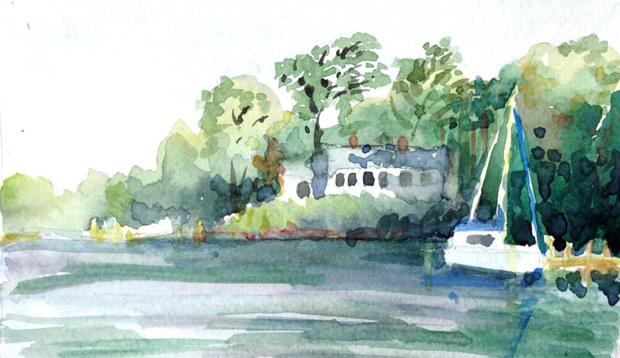To be loved as to love:
A cursory reading of this suggests St. Francis is speaking of loving our fellow man (and woman), but he could have a much bigger meaning here. Maybe he’s advising me to love everything I can. I have observed how alive I feel when doing something I love: designing or writing. My heart glows in my chest and the work flows easily. I feel like dancing.
Come to think of it, I love to dance as well. And to play the piano and watercolor. And walk in the forest, and sail on the Chesapeake Bay and its rivers and creeks. And play cards by the fire with my son and husband. And pick tomatoes in the garden and eat them still warm from the sun. What if St. Francis, in this one sentence, is giving us all permission to do what we love, what nourishes us and connects us to the breathing earth and to each other?
A wise teacher tells me that eros—love—is an actual force, like gravity, that binds us to the earth, if only we give ourselves over to it. Surrender, let the emotion flow out of our senses and imagination, and feel that we are literally in love with Creation. It is our birthright, and, honestly, we just can’t help it.
In seeking not to be loved but to love, I am once again reminding myself to turn outward, and, further, to open my heart, my eyes and ears, my skin and nose and even my mouth. To experience the ecstatic reality of embodying a threshold between inner and outer. Eros awakens the senses, calls me to feel myself as a doorway between the material world and the inner light of spirit.
To be in love with all this is to say yes to the world—which, in the case of sunsets, the full moon, a sleeping child, and baby seals, is easy. But what about the Keystone XL, or ISIS, or gender bias, or climate change? Surely St. Francis isn’t asking me to love all that, too? I am stumped by this, becalmed, stuck.
I can say this: I know that death shadows me always; its presence colors all of our days. I know it’s a condition of being here, that it is nothing short of a miracle that we are here at all. Being with my parents in their final days, holding my father’s hand as he made his final transition, I was surprised by the reality of death. It was less showy and dramatic than I expected. Less “other” and more intimate. My father’s passing felt like a birth-in-reverse. So much irrelevance and distraction was pushed aside, and only love remained. Love and grief and a kind of joy.
I am the youngest of four. Once, during a late-night conversation over a glass of red wine, my cousin told me she always thought my mother loved me more than my siblings. This felt to me like a terrible burden, whether true or not. The idea that a mother’s love is divisible and must be spread thinly over four children, suggests that there’s not enough to go around. Love doesn’t work that way, does it, as a precious commodity that can be out of stock when there’s a run on the shelves? On good days, it feels like the more love you give, the more there is to give. Love is sourced from a bottomless well. If it appears to run out, other factors must be at play.
The limitations and conditions we place on love are a reflection of our own doubts and fears and wounds. Psychology teaches us that what we love outside of us comes from and mirrors hidden places deep within that we are often unaware of. When we project unconsciously, it leads to hero worship and putting loved ones on pedestals, which is not a recipe for a healthy relationship. When I am aware that to show love is to love myself, and vice versa, the whole game changes. I can move on to loving even the seemingly unlovable parts of myself, which are also reflected in (or projected onto) other people. That guy who annoys me with his indecision and anxiety: he is me. That woman yelling at her child on the street: me.
Reciprocity is the order of this world. In loving, I know that I am loved. In seeking to be loved, I am doomed to worry and uncertainty and seeking. In the face of negativity, then, or evil, or simply a miserable personality, the response that St. Francis calls us to is love. Maybe it’s not so much out of altruism or spiritual superiority, though. There is something magical about the very act of loving, of sending love out or simply feeling it inside: it calls forth a deep inner knowing that I am loved.
Part of a series considering the Prayer of St. Francis. Start at the beginning here.

